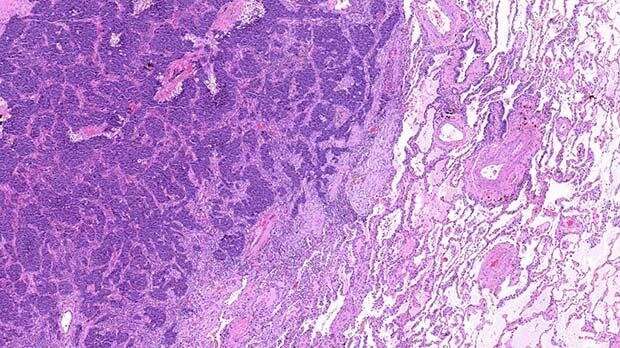
At least 14,000 fewer people have been urgently referred for lung cancer tests since March.
Of all cancer types, referrals for suspected lung cancer have been the hardest hit according to weekly two-week wait (2ww) figures in England. At the end of August, the number of people sent for urgent review and tests in England was still at only around 60% of pre lockdown figures.
It’s thought that initial advice for people to stay at home and isolate if they had a new, continuous cough could have led to some people delaying seeking help.
Issues on multiple fronts
Our survey of 1,000 GPs across the UK in July revealed problems on multiple fronts.
44% of GPs said fewer people were coming to them with coughs or breathing problems, some of the main symptoms of lung cancer.
Difficulties getting chest X-rays for patients—one of the main methods for diagnosing lung cancer—was also flagged as an issue by 45% of GPs. This could in part be due to stronger infection control measures during the pandemic, which have made it harder for radiographers to see as many patients as usual. Staff needing to isolate or shield could also have contributed towards this.
But the drop in urgent referrals could also be due to people’s concerns about visiting hospital. In July, 63% of GPs surveyed said that some of their patients had not wanted to go to hospital for tests in the previous month, even though most hospitals should have established COVID-protected safe spaces by then. It’s especially concerning as without testing, a diagnosis can’t be made, delaying treatment.
Roope says that hospitals and surgeries have worked hard to make services as safe as possible, so it’s as important as ever that people with a new cough or a cough that’s changed, shortness of breath, chest pains for no obvious reason or unexplained weight loss, speak to their GP. “Lung cancer won’t have disappeared during the pandemic and it’s vital we continue to investigate patients proactively so we can to help get a diagnosis as early as possible.”
“It’s time for the Government to show its commitment to the NHS”
Sadly, more people die from lung cancer than any other cancer type. But if it’s found at an early stage it’s more likely treatment will be successful, and the chances of survival will be higher. For many people with lung related symptoms, it won’t be cancer, but it’s just as important as ever that people speak to their GP and attend follow-up tests.
When lung cancer is diagnosed at its earliest stage, 57% of people will survive their disease for five years or more, compared with 3% of people diagnosed at the latest stage.
For those patients who have recently been diagnosed with lung cancer, the chance of starting treatment promptly is beginning to show signs of improvement. In July, 77% of patients began treatment within 62 days of an urgent referral, compared with 63% in June, according to NHS England waiting time figures.
But it’s vital that improvement continues and the pace quickens, so all patients can receive the tests and treatment they need, when they need them.
“The long-term impact delays in diagnosing lung cancer could have on families across the UK is devastating,” says Michelle Mitchell, Cancer Research UK’s chief executive. “It’s as important as ever that anyone with a new cough that’s persisted for three weeks, a change to an existing cough or breathlessness, speaks to their GP as soon as possible.”
Source: Read Full Article